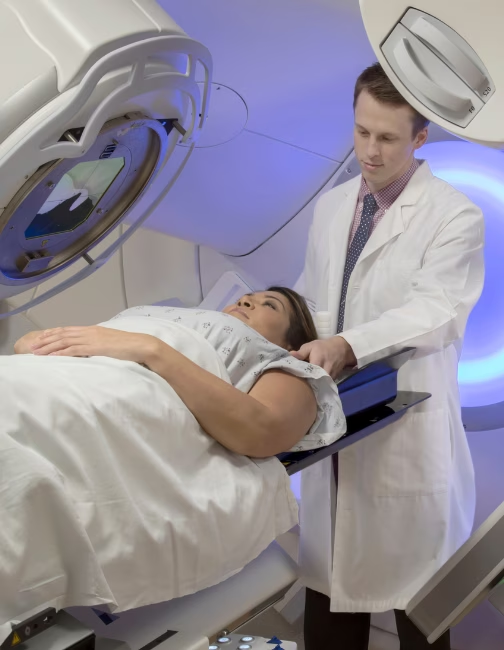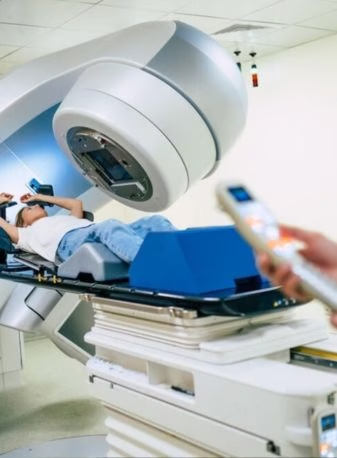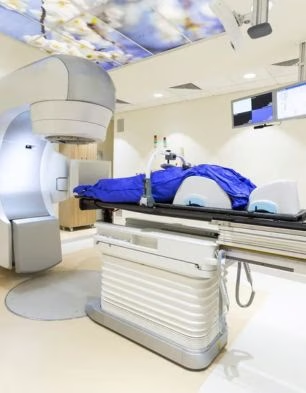Surgery Turkiye combines modern radiotherapy technology with the expertise of experienced oncologists. We ensure that each patient receives personalized treatment, minimizing side effects and maximizing the effectiveness of the therapy. Our clinic is committed to providing high-quality care in a professional and compassionate environment.
- Mon - Fri 8:00 - 18:00
- phone +216 26 555 026
-
 contact@surgeryturkiye.com
contact@surgeryturkiye.com
Radiotherapy Turkiye
Cancer Treatment in Türkiye: Surgery and Radiotherapy
Radiotherapy (also known as radiation therapy) is a vital treatment used to treat cancer by targeting and destroying cancer cells with high doses of radiation. It can be used as the primary treatment for some types of cancer, or it can be combined with surgery, chemotherapy, or immunotherapy to improve outcomes. Turkey has become a leading destination for cancer treatment, including radiotherapy, thanks to its advanced medical technology, experienced oncologists, and affordable healthcare services. Surgery Turkiye offers expert radiotherapy treatment with cutting-edge facilities to ensure the best possible results. Read on to learn more about radiotherapy and how Surgery Turkiye can help in the treatment of cancer.
What is the Price of
Radiotherapy in Turkey?
The cost of radiotherapy can vary depending on factors like the type of cancer, the number of sessions required, and the complexity of the case. Turkey offers competitive pricing for radiotherapy treatments, making it an attractive destination for medical tourism. At Surgery Turkiye, we provide high-quality radiotherapy treatments at affordable prices, with customized care plans tailored to your specific needs. To get a more accurate and personalized quote, it is recommended to request a free consultation. Contact us today to discuss your treatment options.


Why Choose Surgery Turkiye for Your
Radiotherapy Treatment?
-
What makes Surgery Turkiye the ideal choice for radiotherapy treatment?
-
How experienced are the oncologists at Surgery Turkiye?
Our oncologists are highly trained and experienced in delivering radiotherapy for a wide range of cancers. They use the latest techniques and advanced equipment to ensure that each patient receives the most effective treatment possible, tailored to their specific condition.
-
What aftercare is provided following radiotherapy?
At Surgery Turkiye, we provide comprehensive aftercare to support your recovery following radiotherapy. This includes regular follow-up consultations, monitoring for side effects, and providing advice on managing any symptoms during treatment. Our team is here to ensure your treatment journey is as comfortable as possible.
-
Is radiotherapy safe, and what is the success rate?
Radiotherapy is a safe and widely used treatment for many types of cancer. When performed by experienced oncologists and with the latest technology, it is highly effective. Surgery Turkiye follows strict medical protocols to ensure the safety and effectiveness of radiotherapy treatments, with a high success rate for treating various cancers.
Patient Reviews for
Radiotherapy
I was diagnosed with breast cancer and underwent radiotherapy at Surgery Turkiye. The team was extremely professional, and the process was smooth. I’m now in remission and feel great. The care I received was outstanding.
I had prostate cancer and received radiotherapy treatment at Surgery Turkiye. The oncologists were skilled, and I felt well taken care of throughout the process. I am grateful for the expertise and compassion I received, and I’m now cancer-free.
Radiotherapy was part of my treatment for cervical cancer. Surgery Turkiye made me feel comfortable and supported, and I’m happy to report that I’m in remission. The whole experience was very positive, and I highly recommend their services.
What is the Process of
Radiotherapy?

Initial Consultation
The first step is a consultation with a radiation oncologist who will review your medical history, perform a physical exam, and discuss your diagnosis. The doctor will explain how radiotherapy will be used in your treatment plan and answer any questions you may have.

Treatment Planning
Once radiotherapy is recommended, a planning session is scheduled. This involves imaging tests (such as CT or MRI scans) to map out the exact location of the tumor. The oncologist will determine the optimal dosage of radiation and the number of treatment sessions needed. This step ensures that the radiation is precisely targeted to the tumor.

Radiotherapy Administration
Radiotherapy is typically given as an outpatient procedure. The radiation is delivered through a machine called a linear accelerator, which directs radiation beams to the tumor. Treatment sessions are usually short, lasting between 10 to 30 minutes. Depending on the treatment plan, radiotherapy may be given daily or several times a week.
What Are the Benefits of
Radiotherapy?
-
Targeted Cancer Treatment
Radiotherapy is highly effective in targeting cancer cells while minimizing damage to surrounding healthy tissues. This makes it an ideal treatment for tumors located in difficult-to-reach areas or those that are inoperable.
-
Shrinks Tumors
Radiotherapy can shrink tumors, making them easier to remove surgically or more responsive to other treatments, such as chemotherapy. It can also be used to reduce the size of tumors that are causing symptoms like pain or obstruction.
-
Combination with Other Treatments
Radiotherapy is often used in combination with other cancer treatments, such as surgery, chemotherapy, or immunotherapy. This enhances the overall effectiveness of the treatment plan and increases the chances of achieving remission or a cure.
-
Palliative Care
In addition to curative treatments, radiotherapy is also used for palliative care to relieve symptoms of advanced cancer, such as pain, bleeding, or difficulty swallowing. It can significantly improve the quality of life for patients in the later stages of cancer.


What Are the Results of Radiotherapy?
The results of radiotherapy vary depending on factors such as the type and stage of cancer, the specific treatment regimen, and the patient’s overall health. However, many patients experience significant improvements following radiotherapy treatment.
Immediate Results
After a few sessions, patients often notice relief from symptoms caused by tumors, such as pain, swelling, or bleeding. The tumor may also begin to shrink, which can lead to immediate improvements in quality of life.
Long-Term Results
In the long term, radiotherapy can lead to remission or even cure for certain cancers, particularly those diagnosed in earlier stages. For patients with advanced cancer, radiotherapy can help control tumor growth, reduce symptoms, and improve survival rates. Regular follow-up appointments are crucial to monitor progress and detect any potential recurrence.

